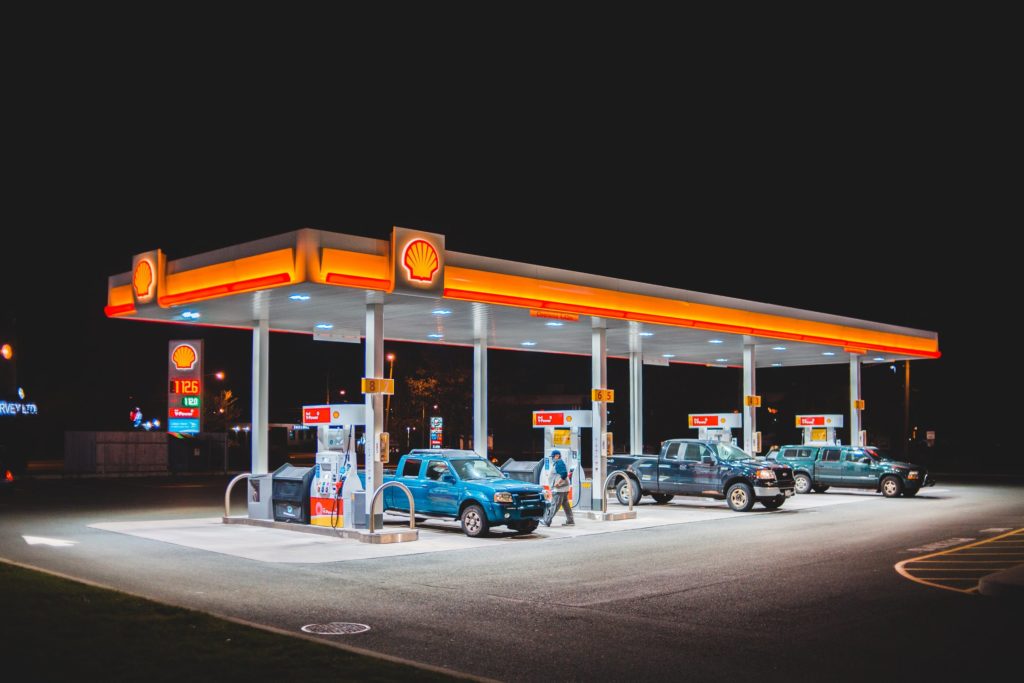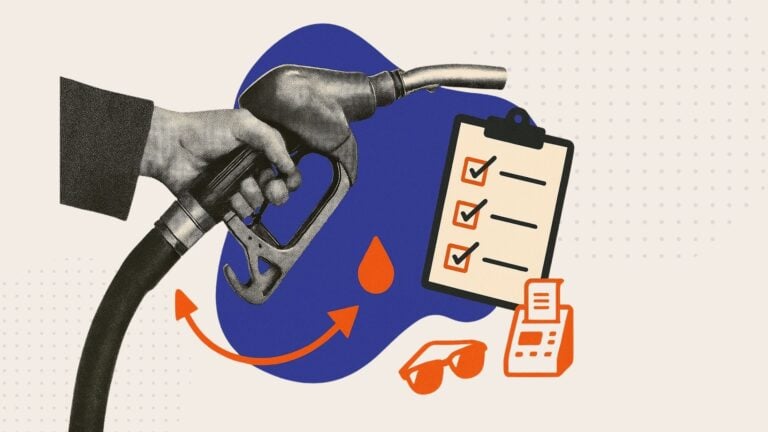Knowing how to start a gas station successfully is only part of the process of starting a gas station business. Here’s your in-depth 10-step guide to get your gas station running smoothly!
Starting a gas station takes more than just fuel. This in-depth guide covers everything you need to know to launch a successful gas station business.
Opening a business can be a complex process full of surprises, and opening a gas station is no different. With a US market size estimated at $597.3 billion in 2025, there’s plenty of opportunity…if you play your cards right.
If you’ve always dreamed of owning your own business but aren’t sure how to open a gas station, this guide walks you through every step. Follow along closely to ensure your new business is well-planned, legally compliant, and set up for success.
The Watercooler EP 04: How to Open a Gas Station
Jessica and Tod dive into the steps and considerations involved in opening a gas station. Learn about the key factors, from securing a location to managing operations, in this insightful conversation.
Write Your Business Plan
Like any successful business, opening a gas station starts with careful planning. Your business plan is more than just a list of goals; it helps you define, describe, and analyze the specifics of your business and is essential for securing funding.
To give you a clear picture of your path forward, here’s where to start:
Market analysis
Gas stations operate in a competitive market characterized by razor-thin profit margins, typically less than 2%. That’s why it’s important to research and understand your competition. Learning from their successes and avoiding their mistakes can give your gas station a leg up.
As part of your market analysis, here are some questions to consider:
- What are your competitors’ strengths, and how can you apply them to your own business?
- What are your competitors’ weaknesses, and how can you avoid making those same mistakes?
- How can you solve the same problems better (or differently) than your competitors?
- Who are your direct competitors, and could they pose a significant threat to your success?
- Who is your ideal customer?
- How can your location drive more traffic to your business?
Choosing the right location
The location of your gas station can make or break your business, so it should be a priority during the planning stage. If you’ve done your market analysis correctly, you should already have a good idea about whether your location can support long-term growth. Are you opening along a busy highway to attract truck drivers and commuters? Or setting up across from an underperforming competitor you can outdo?
A smart strategy is to scout out up-and-coming neighborhoods or industrial parks just outside city limits. These areas often need a gas station and come with cheaper real estate. However, keep in mind that these locations may lack the infrastructure you need to get things going.
How much does it cost to open a gas station?
Starting a gas station isn’t cheap. You can expect to spend anywhere between $250,000 to $2,000,000+ to get your business off the ground. The exact costs can vary, depending on which state you’re in, your location, and whether you buy a franchise or open an independent location. Your business plan should include detailed estimates of all the cost involved.
Here are some of the costs you should look into:
- Purchasing or leasing the location
- Securing a franchise agreement
- Registering your business
- Trademarking a business name
- Insurance, licenses, permits, and other legal fees
- Securing a supplier
- Inventory (gas, consumables)
- Setting up your gas station
- Setting up your convenience store
- Hiring and training employees
- Royalties per your franchise agreement
- Marketing materials
In addition to startup costs, your business plan should include a realistic estimate of your gas station’s ongoing operating expenses. Consider everything from licensing and insurance to fuel inventory, utilities, and employee payroll.
List your products and services
Modern gas stations are more than just fuel stops. To stay competitive and boost profits, most successful stations offer additional services. Your business plan should detail how many fuel pumps you intend to operate (based on your market research) and what other offerings you’ll include to maximize your profit margins.
Common options include:
- Convenience stores selling snacks, drinks, car accessories, tobacco, alcohol, and lottery tickets
- Car washes (full service or self-service)
- Air pumps
- Public restrooms
- Basic mechanic services like oil changes (though this is less common today)
Each service comes with its own set of costs, permits, and upkeep. If you operate under a franchise, there may be limits on what you can offer.
Did You Know?
While the US gas station sector is estimated to be worth $121.0 billion in 2025, the market for gas stations with convenience stores is projected to reach $553.2 billion in 2025 (down from $597.3 billion in 2024).
Set Up Your Business
Form a legal entity
Once you create your business plan, the next step is to form a legal business entity. When you choose a legal structure for your gas station, consult a legal professional to understand how this decision can impact your liability, taxes, and ability to raise funding.
Avoid sole proprietorships for this type of business. While they’re the easiest to set up and offer tax benefits, they leave you personally liable for the very real risks of accidents, lawsuits, or theft.
Most gas station owners form an LLC (Limited Liability Company). This gives you liability protection and tax flexibility, allowing you to choose between being taxed as a sole proprietor or a corporation. LLCs are usually pretty affordable to set up, making them a good option if you plan to operate a single location.
Corporations offer similar legal protections as LCCs, but come with more regulatory requirements, higher fees, and potential double tax (corporate tax AND income tax). However, forming a corporation is a good fit if you plan to grow into a multi-location chain.
You can register an LLC or corporation easily; many states let you do this online. For a fee, a third-party service will handle the paperwork for you, including your IRS registration. Whichever way you choose, DON’T SKIP THIS STEP! Forming a proper legal entity is essential to protecting yourself and your business.
Register for taxes
As a small business owner, you need an Employer Identification Number (EIN) to legally open and operate your gas station. This nine-digit number is issued by the IRS and is required when filing federal business taxes. used when filing your business taxes with the IRS. You can apply online through the IRS website and you should receive your number in just a few minutes.
In addition to a federal EIN, some states require a state tax ID. This depends on your location and the specific tax laws in your state. To avoid penalties or compliance issues, consult with an accountant or tax attorney to make sure your tax registrations are all set from day one.
This Might Interest You
Learn more about the requirements in your state with our State Labor Law guide!
Buy a franchise
Many first-time gas station owners choose to get into business by buying a franchise. This approach reduces some of the startup risks and gives you immediate brand recognition, which can drive traffic and boost your credibility.
Since franchise agreements vary widely, it’s important to fully understand the terms before signing. Most major brands have strict requirements for new franchisees, and some may even require prior management or business ownership experience.
Here are some of the bigger gas station franchises to consider:
Before committing, have a lawyer experienced in franchise law review the franchise disclosure document (FDD). Lawyers can help you understand your obligations, negotiate better terms, and potentially lower upfront fees or ongoing royalties. Negotiating your agreement well can impact your long-term profitability.
Open a business bank account and credit card
A common mistake many new business owners make is using their personal bank account for business expenses. This can not only complicate your accounting but also put your personal assets at risk if your business ever faces legal trouble.
Avoid this by opening a business bank account from the start. It keeps your finances organized and can help establish your business as a separate legal entity.
It’s smart to start building business credit early. A solid credit history can help you secure financing, qualify for business credit cards with better rates, and access higher credit limits under your business’s name.
Get Funding For Startup Costs
With your business plan complete and your legal entity established, it’s time to get funding for your gas station. Opening a gas station can cost between $250,000 and $2 million, so outside funding is often essential.
If you’ve done your homework in your business plan, you are well set up to request a loan. Here are a few ways to get a business loan:
Business loan from a bank
If this isn’t your first rodeo and you can show a stellar track record with previous businesses, a conventional bank loan can be an option. But even then, most banks will decline your request for a loan due to traditionally slim profit margins and the perceived risk of a gas station business. This doesn’t mean you shouldn’t try, but you should come well-prepared with a water-tight business plan and anything documenting your previous business experience.
Small Business Administration (SBA) loans
The Small Business Administration has loan programs designed to help small businesses, such as gas stations, get started. While the SBA doesn’t lend money directly to you, they work with other lenders to reduce their risk on a loan by backing it by as much as 85%.
SBA loans usually require low down payments and offer reasonable interest rates but you may have to put down a lot of collateral. SBA loans also require a lot of paperwork, can be difficult to secure, and usually take a long time to get approved.
Other options
Besides loans, prospective gas station owners often fund their initial costs through low APR business credit cards or friends and family. Business credit cards can be a good option for smaller purchases like equipment and inventory, but you need to be careful to pay off what you owe in time.
Family and friends can also be a good option if you can agree on mutually beneficial terms with everyone. These can range from zero-interest loans to them receiving equity in your business. Be warned, though, that mixing business and family has ruined more than one relationship.

Buy Property and Equipment
Once you’ve secured funding, you’re ready to buy or lease the property for your station. Before you sign anything, here are a few important pitfalls to keep in mind:
Equipment ownership
If the site has this equipment, verify whether the pumps, tanks, and other equipment are part of the sale. In many cases, these are leased separately or owned by a franchise, not the property seller. Consider the following:
- Depending on your franchise agreement, you may be required to use specific branded equipment. In these cases, it’s better to exclude incompatible equipment from the purchase.
- Always have a qualified attorney review the purchase or lease agreement to make sure your business interests are protected.
- Ask for maintenance records of all existing equipment to confirm compliance with local regulations and avoid buying faulty systems.
Environmental Assessment
If you want to open a gas station, you must commission a Phase I Environmental Assessment before buying the property. This report, which has to be prepared by a licensed environmental professional, reviews the site’s environmental history and surrounding areas.
Without this document, your SBA loan can’t be approved. More importantly, if the Phase I Assessment uncovers an issue, you may be able to cancel the sale if your agreement includes an environmental contingency clause.
All Essential Gas Station Documentation in One Place
Use a Digital Solution to Store Your Phase 1 Environmental Assessment and All Other Documents for Your Gas Station
Find A Supplier
If you’re operating your gas station under a franchise, check your franchise agreement to see if you are required to work with a specific fuel supplier. If you have the option to choose your supplier, it’s time to research and compare rates. Remember:
Don’t sign anything before a lawyer reviews your franchise and supplier agreements to make sure you’re not entering a bad deal.
Fuel suppliers often take a percentage of your sales, so even small differences in contracts can impact your bottom line.
Your business plan should give you a good estimate of your fuel volume needs and delivery frequency. This helps negotiate better terms.
Get All Necessary Permits And Insurance
You can’t open your gas station without the proper permits and insurance. Licensing agreements depend on location, so check your local regulations so you can stay compliant.
Common licenses and permits include:
- Building and fire safety inspections
- Tank and fuel pump inspections
- Water discharge permits
- Alcohol, tobacco, and lottery licenses
- Food and beverage vendor licenses
- Certificate of occupancy
- Health inspection clearance
This is also a good time to get proper business insurance. General liability insurance isn’t enough for a gas station. You might also need:
- Workers’ compensation insurance
- Fuel tank contamination insurance
- Liquor liability insurance (if selling alcohol)
- Franchise insurance (if relevant)
Pro Tip
Work with an insurance broker familiar with gas stations to make sure you’re covered from every angle.
Set Up Your Day-To-Day Responsibilities
Establish hours of operation
When you write your business plan, you’ll probably decide on your operating hours. Many gas stations, especially in busy areas, are open 24/7. If you want to keep up with the competition, you might have to do the same. That means hiring enough employees to cover all shifts.
Take the time to research the benefits of full-time vs. part-time employees and the different types of work schedules. To manage your team efficiently, invest in tools that handle employee time tracking, job and shift scheduling, communication, and performance reporting in one platform.

Learn about inventory management
Since most gas stations sell more than just fuel (think: snacks, drinks, car accessories), it’s a good idea to stay on top of your inventory. Keeping a running inventory every day helps you track what’s selling, avoid shortages, and plan restocks ahead of time. Build strong relationships with your vendors and understand their delivery timelines so you can coordinate resupplies smoothly and keep your shelves stocked.
Set up security measures
Crime is a major risk for gas stations, especially those open 24/7. Insurance can cover theft, but making sure your employees are safe should be your top priority. Install security cameras, shatter-proof windows, and proper lighting to deter crime. Most importantly, create clear emergency protocols so your staff knows what to do if something happens.
Market Your New Gas Station
Now that all the hard setup work is out of the way, it’s time to start marketing your new business. The right location can bring in drive-by traffic, but you need a solid marketing strategy for long-term success. Here’s where to start:
Become visible online
Add your gas station to Google Maps, Apple Maps, and Waze so drivers can find you when they’re looking for nearby fuel. Set up business accounts on Yelp and local business directories, and consider creating a social media strategy for platforms like Facebook, Twitter, Instagram, and TikTok.
Use highway and pole signage
Good, old-fashioned highway signage near exits and high-traffic roads can attract drivers. Highlight fuel prices, special deals, or food options to convert passersby into customers.
Offer a loyalty program
To keep people coming back, offer a loyalty program to build up a customer base. Retaining existing customers is more cost-effective than attracting new ones, so use rewards to your advantage.
Lower your gas prices
Gas stations operate on very thin profit margins when it comes to fuel sales alone. Consider lowering your gas prices by just a few cents to attract customers to purchase items from your convenience store for a better profit margin.
Partner with food franchises
Partner with food franchises to turn your gas station into a convenient rest stop. This attracts more customers, and also encourages longer visits and higher in-store sales.
Prepare For The Future
It’s no secret that the gas station industry is facing a long-term decline. In 2025, there are between 115,000 and 160,000 gas stations in the US, but the shift to electric vehicles (EVs) is ramping up.
That doesn’t mean that people are driving less, but they are driving differently. Installing EV charging stations can give your gas station a competitive edge. Not only will this prepare your gas station for the future, but it will also put your business on the map for EV drivers and ensure a steady flow of customers.
The Bottom Line on Starting a Gas Station
Starting a gas station takes serious capital, tight planning, and constant operational discipline. Margins are slim, but a well‑run station in the right location can generate reliable profits and long‑term growth.
The key is efficiency: from staffing 24/7 shifts to staying compliant and managing daily operations, every detail matters.
That’s where Connecteam comes in. With free built‑in scheduling, time tracking, payroll prep, and instant communication, you can keep your team aligned and your business running smoothly—while you focus on fueling success.
FAQs
How much does it cost to start a gas station?
Startup costs range from $250,000 to $2 million depending on location, whether you buy or lease property, and if you open as a franchise or independent. Franchise fees and equipment can push costs higher.
How much profit can a gas station make per month?
Profit margins on fuel are usually under 2%, so most stations rely on convenience store sales and add‑on services. Depending on traffic and offerings, monthly profits can range from $5,000 to over $20,000.
Is owning a gas station a good investment?
It can be, but it depends on location, management, and diversification. Stations near highways or in underserved areas tend to perform best. Adding car washes, food options, or EV chargers can boost ROI.
Do I need experience to open a gas station?
Not necessarily, but experience in business management or retail operations helps. If you buy a franchise, many require some background in business ownership or management.
Should I buy a franchise or open independently?
Franchises give you brand recognition, supply agreements, and support, but they come with high fees and strict rules. Independent stations have more freedom but require more upfront effort to establish suppliers and attract customers.
What licenses do you need to open a gas station?
Typical requirements include building and fire inspections, fuel tank permits, business licenses, food and beverage licenses (if applicable), and insurance. Requirements vary by state and city.
What risks come with owning a gas station?
Risks include theft, environmental liability from fuel tanks, regulatory fines, fluctuating fuel prices, and high staff turnover. Proper insurance and compliance reduce these risks.
How are gas stations adapting to electric cars?
Many owners are adding EV charging stations to attract new customers and future‑proof their businesses. Incentives and grants may help offset installation costs.




